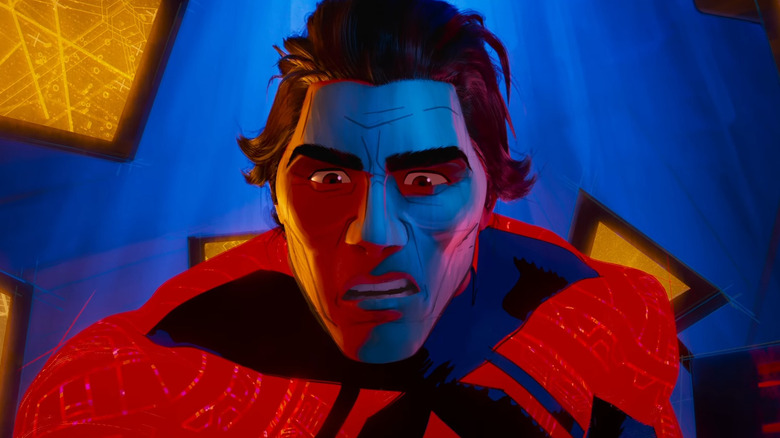Spider-Man: Across The Spider-Verse Fundamentally Changes Spider-Man 2099
There's a lot to love about Sony Pictures Animation's electric superhero masterpiece "Spider-Man: Across the Spider-Verse," but its stunning ensemble cast may be what makes this film truly spectacular. The sequel features all manner of Spider-People, including a cartoonishly edgy Scarlet Spider (voiced by The Lonely Island and "Saturday Night Live" alum Andy Samberg), a slick Jessica Drew debut (from the multi-hyphenate superstar of HBO's "Insecure," Issa Rae), and the welcome return of old favorites like Shameik Moore's Miles Morales, Hailee Steinfeld's Gwen Stacy, and Jake Johnson's Peter B. Parker.
But while each and every one of them leaves a distinctive mark on the intricate web of "Across the Spider-Verse," the film's gravitational center may just be the introduction of Miguel O'Hara, the Spider-Man of the year 2099. Voiced by veteran actor and frequent Marvel star Oscar Isaac ("X-Men: Apocalypse," "Moon Knight"), Miguel serves as the film's not-so-secret secondary antagonist and is a perfect foil for Miles during the teen hero's newest complicated quest for justice and self-discovery.
That said, Miguel from "Spider-Verse" is not an exact replica of his comic counterpart. With a slightly retooled origin and shifted ethos, he may not be the Spider-Man 2099 fans expected to get when they walked into the theater. But that still doesn't mean he isn't one of the best comic book movie antagonists of the decade.
Miguel O'Hara isn't usually a loner, but he needed to be for this story
During the development process of the original "Marvel 2099" series, writer Peter David created Miguel O'Hara by trying to distance the character as much as possible from Peter Parker. As he recalled in an interview with the website Doom 2099, "...I decided I would zig wherever Stan [Lee] and Steve [Ditko] zagged when they created Spider-Man. Peter Parker was a white bred WASP. So Miguel O'Hara was a combined ethnicity. Peter was an orphan. Miguel would have a living mother. Peter was alone. I gave Miguel a brother. Peter had no idea how to handle girls.... [Miguel] had a fiancée."
While Miguel's Mexican-Irish heritage was maintained for "Across the Spider-Verse," the creative team behind the film chose not to include Miguel's various relationships. There is no mention of a brother, a mother, or a fiancée –- instead, he is portrayed as a defiant loner whose one attempt at connection resulted in total universal destruction. The film also portrays him as proto-authoritarian, when the Miguel of the comics actively rebels against shadowy forces that claim to maintain order for the greater good.
Yet, if Miguel were exactly how David originally wrote him, there would be less opportunity for conflict between him and Miles. He needs to have suffered the most extreme, permanent loss to be driven to such a drastic point in his life, which consequently turns him into an effective antagonist for a hero that wants to avoid the same loss in a different way. "Across the Spider-Verse" succeeds in tailoring a fan-favorite character to the needs of their story while maintaining his general vibe, enough so that hopefully, longtime comic book fans won't get too bent out of shape when they see the film.

